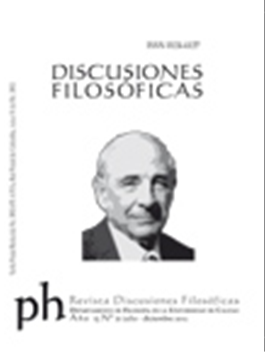Authors
Abstract
This article is part of a research project that seeks to determine a class of disagreements understandable as a field of arguments that do not obtain due to misunderstandings but because of the nature of some social phenomena. This paper approaches this field through the notion of essentially contested concepts (Gallie), and argues that one can understand this kind of disagreement successfully, following classical rhetoric, as a field constituted by a class of questions of definition. This article has two parts: the first explains Gallie's notion of essentially contested concept and some notes on its reception. The second part clarifies the notion of field of argumentation, the debate on how to understand this notion, and the question of how to understand the field of argumentation related to essentially contested concepts.
References
Aristóteles. Retórica. Madrid: Gredos, 1990. Impreso.
Collier, David, Fernando Daniel Hidalgo, and Andra Olivia Maciuceanu. “Essentially contested concepts: Debates and applications”. Journal of Political Ideologies. Oct. 2006: 211-246. Print.
Connelly, Steve. “Mapping sustainable development as a contested concept”. Local Environment. Jun. 2007: 259-278. Print.
Connolly, William. The terms of political discourse. 3rd ed. London: WileyBlackwell, 1993. Print.
Gadamer, Hans-Georg. Verdad y método II. Salamanca: Ediciones Sígueme, 2004. Impreso.
Gallie, Walter Bryce. Conceptos esencialmente impugnados. Vol. 49. México: Instituto de Investigaciones Filosóficas de la UNAM, 1998. Impreso.
Grafstein, Robert. “A realist foundation for essentially contested political concepts”. The Western Political Quarterly. Mar. 1988: 9-28. Print.
Gray, John. “On liberty, liberalism and essential contestability”. British Journal of Political Science. Oct. 1978: 385-402. Print.
Hamilton, Richard Paul. “Love as a contested concept.” Journal for the Theory of Social Behaviour. Sep. 2006: 239-254. Print.
Hurley, S. L. Natural reasons: Personality and polity. Oxford: Oxford University Press, 1992. Print.
Klumpp, James. “A dramatistic approach to fields”. Ziegelmueller, G. and J. Rhodes (eds.). Dimensions of argument: Proceedings of the Summer Conference on Argumentation. Utah: Speech Communication Association, 1981. Print.
Lakoff, George. The political mind: Why you can’t understand 21st-Century American politics with an 18th-Century brain. New York: Viking Adult, 2008. Print.
Lausberg, Heinrich. Manual de retórica literaria Tomo I. Madrid: Gredos, 1976. Impreso.
Lukes, Steven. El poder: un enfoque radical. Madrid: Siglo XXI de España, 1985. Impreso.
MacIntyre, Alasdair. “The essential contestability of some social concepts”. Ethics. Oct. 1973: 1-9. Print.
Mason, Andrew. “Justice, contestability, and conceptions of the Good”. Utilitas. Nov. 1996: 295-305. Print.
McKerrow, R. E. “Argument communities”. Trapp, R. and J. Schuetz (ed.). Perspectives on argumentation: Essays in honor of Wayne Brockriede. Illinois: IDEBATE Press, 2006. Print.
---. “On fields and rational enterprises: A Reply to Willard”. Ziegelmueller, G. and J. Rhodes (eds.). Dimensions of argument: Proceedings of the Summer Conference on Argumentation. Utah: Speech Communication Association, 1981. Print.
Miller, D. “Linguistic philosophy and political theory”. Miller, D. and L. Siedentop (ed.). The nature of political theory. Oxford: Clarendon Press, 1983. Impreso.
Moten, Abdul. “Understanding terrorism: Contested concept, conflicting perspectives and shattering consequences”. Intellectual Discourse. Jan. 2010: 35-63. Online.
Reitan, Eric. “Rape as an essentially contested concept”. Hypatia. May. 2001: 43-66. Print.
Rowland, Robert. “Argument fields”. Benoit, William L., Hample, Dale and Pamela J. Benoit. Readings in argumentation. New York: Foris Publ., 1992. Print.
---. “Purpose, argument fields, and theoretical justification”. Argumentation. May. 2008: 235-250. Print.
Toulmin, Stephen. Los usos de la argumentación. Barcelona: Peninsula, 2007. Impreso.
Waldron, Jeremy. “Is the rule of law an essentially contested concept (in Florida)?” Law and Philosophy. Mar. 2002: 137-164. Print.
Willard, Arthur. “Field theory: A cartesian meditation”. Ziegelmueller, G. and J. Rhodes (eds.). Dimensions of argument: Proceedings of the Summer Conference on Argumentation. Utah: Speech Communication Association, 1981. Print.
---. “Some questions about Toulmi’s view of argument fields”. Ziegelmueller, G. and J. Rhodes (eds.). Dimensions of argument: Proceedings of the Summer Conference on Argumentation. Utah: Speech Communication Association, 1981. Print.

 PDF (Español)
PDF (Español)
 FLIP
FLIP

























